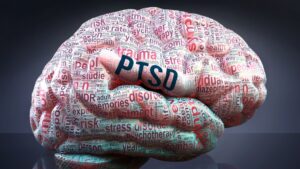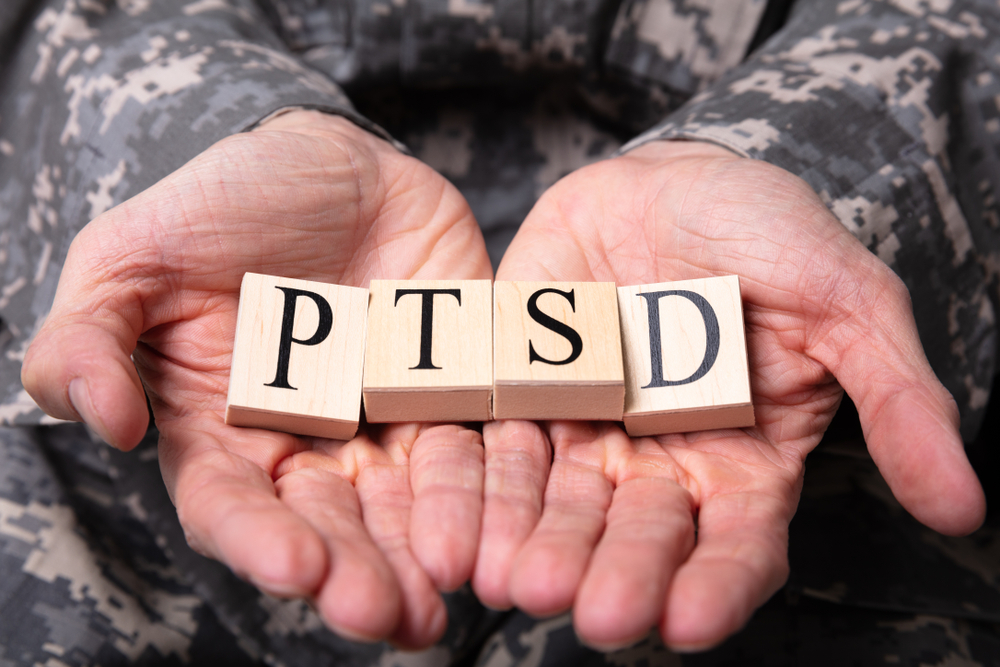Post-Traumatic Stress Disorder (PTSD) is a debilitating mental health condition that affects individuals who have experienced or witnessed traumatic events. It manifests through intrusive memories, nightmares, hyperarousal, and emotional distress, often leading to a diminished quality of life. As researchers explore alternative treatments, cannabis has emerged as a potential therapeutic option. This article explores the positive and negative relationship between cannabis and PTSD, considering genetic effects and the body’s ability to cope with the disorder.
Positive Effects of Cannabis:
Cannabis contains compounds known as cannabinoids, notably THC (tetrahydrocannabinol) and CBD (cannabidiol), which interact with the endocannabinoid system in the human body. This system plays a crucial role in regulating mood, memory, and stress responses. Studies suggest that cannabis may alleviate some symptoms of PTSD, providing relief for those affected.
Anxiety and Fear Reduction: Individuals with PTSD often experience intense anxiety and fear. Cannabis has been reported to help mitigate these symptoms, as cannabinoids interact with receptors in the brain responsible for regulating fear responses. By reducing fear and anxiety, cannabis may provide a sense of calm and relaxation.
Sleep Improvement: Sleep disturbances are prevalent in PTSD patients, leading to further emotional and cognitive impairment. Cannabis, particularly strains with higher CBD content, may promote better sleep quality by easing insomnia and reducing nightmares associated with PTSD.
Negative Effects of Cannabis:
While cannabis shows promise in managing PTSD symptoms, it is essential to consider potential drawbacks and individual variations in response.
Increased Anxiety: In some cases, cannabis use can paradoxically exacerbate anxiety and panic symptoms. The psychoactive properties of THC may induce or amplify feelings of paranoia and anxiety, particularly in high doses or for individuals predisposed to these effects.
Memory Impairment: One hallmark symptom of PTSD is intrusive memories and flashbacks. However, cannabis, especially strains with higher THC levels, can impair short-term memory and cognitive function, potentially interfering with therapeutic progress and exacerbating memory-related symptoms.
Genetic Influences on PTSD and Cannabis Response:
Genetic factors play a significant role in determining an individual’s susceptibility to PTSD and their response to cannabis-based treatments.
Genetic Predisposition: Certain gene variations have been identified as potential contributors to PTSD vulnerability.
Endocannabinoid System Variants: Genetic variations in the endocannabinoid system may affect the body’s response to cannabinoids found in cannabis. Variants in genes encoding cannabinoid receptors or enzymes responsible for metabolizing cannabinoids could influence an individual’s sensitivity to cannabis and its therapeutic effects on PTSD symptoms.
The Role of Genetic Testing:
Genetic testing offers valuable insights into an individual’s genetic makeup, providing personalized information that can guide treatment decisions for PTSD, including the use of cannabis-based therapies.
Identifying Genetic Markers:
Genetic testing can identify specific genetic markers associated with increased susceptibility to PTSD, helping individuals understand their potential risk. This knowledge can enable preventative measures and informed decisions regarding treatment options, including cannabis use.

Personalized Treatment Plans:
By analyzing an individual’s genetic profile, genetic testing can help healthcare professionals tailor treatment plans to each patient’s unique needs. This includes determining optimal cannabis strains, dosage, and monitoring potential adverse effects, taking into account an individual’s genetic variations in the endocannabinoid system.
Post-Traumatic Stress Disorder (PTSD) is a complex mental health condition that requires careful consideration when exploring treatment options such as cannabis. Understanding the positive and negative aspects of cannabis use for PTSD, as well as genetic influences on its effectiveness, can help individuals make informed decisions.
Cannabis has shown potential in reducing anxiety, fear, and sleep disturbances associated with PTSD. However, it is crucial to note that individual responses to cannabis may vary, and some individuals may experience increased anxiety or memory impairment as a result of its use. Genetic factors also play a significant role in determining an individual’s susceptibility to PTSD and their response to cannabis-based treatments.
Disclaimer:
In conclusion, cannabis may hold promise as a therapeutic option for individuals with PTSD, but careful consideration is necessary. Genetic testing provides valuable insights that can guide treatment decisions, ensuring personalized care and optimizing the benefits of cannabis-based therapies for PTSD.
It is essential to note that the information provided in this article is for educational and informational purposes only and should not be considered as medical advice. The content presented here is not a substitute for professional medical guidance, diagnosis, or treatment.
Individuals dealing with Post-Traumatic Stress Disorder (PTSD) should consult with qualified healthcare professionals, including mental health specialists or physicians, to receive personalized advice and recommendations. Every individual’s condition is unique, and treatment decisions should be based on a comprehensive assessment by a qualified healthcare provider who is familiar with the individual’s medical history and specific needs.
While the article aims to provide an overview of the relationship between PTSD, cannabis, and genetic factors, it is crucial to seek professional guidance before making any decisions regarding cannabis use or altering existing treatment plans. Healthcare professionals can consider the individual’s complete medical history, potential drug interactions, and personalized genetic factors to provide tailored advice and treatment options.
Always consult a healthcare professional for accurate medical advice, diagnosis, or treatment related to PTSD or any other medical condition.
To access our free cannabis dosage calculator–
Click Here!!!
References
https://pubmed.ncbi.nlm.nih.gov/24935052/
https://pubmed.ncbi.nlm.nih.gov/30087591/
https://onlinelibrary.wiley.com/doi/full/10.1111/pcn.12820
https://journals.sagepub.com/doi/abs/10.1177/0269881119882806
https://www.sciencedirect.com/science/article/pii/S0165032720306364?via%3Dihub
https://www.nature.com/articles/npp2014132
http://veteransformedicalmarijuana.org/content/general-use-cannabis-ptsd-symptoms
https://pubmed.ncbi.nlm.nih.gov/24897957/

